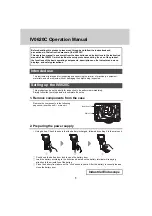
8
West Mountain Radio
Operating Manual
•
Recharge batteries immediately with an appropriate battery charger after the test is completed. Some
types do not like to remain discharged for extended periods of time.
•
Never test or charge batteries while unattended.
•
Always have a fire extinguisher nearby.
CBA Operating Requirements:
•
Never connect a battery with the polarity reversed.
•
Always connect the USB cable to the CBA BEFORE connecting the battery.
•
Be aware the heatsink of the CBA is at battery potential (positive terminal of battery).
•
Never connect a battery to the CBA if that battery is connected to something else.
•
Contact West Mountain Radio for support before connecting to a USB hub.
•
Operate the CBA in a cool dry location.
•
Never allow metal parts or wiring of the battery to come in contact with the metal heat sink of the CBA.
•
Never allow the cooling fan to be blocked or jammed.
•
Do not ignore the warnings from the CBA Software.
•
The CBA can get hot. Do not touch the metal heat sink while, or shortly after, conducting a high power
test.
Lead Acid Battery Safety Warnings:
Adhere to all safety considerations with lead acid batteries, especially while charging. These batteries, especially
automotive and marine types, give off explosive hydrogen gas when charged. A nearby or internal spark or
flame can cause a lead acid battery to explode sending liquid acid and lead shrapnel in all directions. This is
particularly dangerous and frequently causes blindness or severe scarring injuries.
Never use a standard lead acid battery without proper ventilation. Sealed lead acid batteries such as gelled or
AGM (absorbed glass mat) types are much safer. Automotive and marine types are not as safe and should be
used in protective ventilated housings.
Never make the last connection to a lead acid battery that may cause a spark on the terminal. Always connect
the load or charger last, and at a safe distance away from the battery.
NiCad, NiMh, and Alkaline Safety Warnings:
Adhere to all safety considerations, as these types of batteries can also be dangerous. If they are shorted
out or charged/discharged at too high a rate, they can overheat and explode. A single D size NiCad cell can
actually melt a 10 penny (9 gauge) nail (it is not recommended to attempt.)
Lithium Safety Warnings:
Reprinted with permission of the Academy of Model Aeronautics
Words in bold
and
( ) were added by West Mountain Radio
Lithium Battery Fires









































